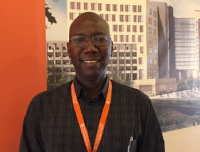Persistent Trauma of Systemic Racial Inequities and the Perils of COVID-19
Persistent Trauma of Systemic Racial Inequities and the Perils of COVID-19

Racial and related inequities have immensely traumatized Black and Brown citizens of the United States for centuries. The COVID-19 pandemic and its rates of infection, disease burden, and fatality have unprecedentedly exposed the devastating consequences of racially defined health, mortality, and economic disparities in the US.
It is not surprising then that many black and brown people are experiencing tremendous anger, outrage, and anxiety. Others feel exhausted, tired, and hopeless. Still, others feel numb and traumatized. All these feelings are valid responses to these events. These feelings tell us that what we see is not okay. While some of our emotions will lead us to mobilize our resources outward, others tell us we need to conserve and find some meaning in what we can do. However, if left unchecked, these emotions can also highjack our thoughts and behaviors, leading us to neglect ourselves. Hence, it is imperative to take stock, experience these emotions, understand the whys, and try to get to “what now?”.
First a brief perspective. We may want to ask how the culmination of centuries of traumatic racial and related inequities, the repeated traumatic scenes of killings of unarmed Black people like Ahmaud Arbery, Breonna Taylor and George Floyd, on top of the racially disparate tolls of the COVID-19 pandemic, led to the ‘earthquakes of inequities that got the brewing volcanoes of protests to erupt’?
Then we need to remind ourselves that Historic Racial Inequities are Today’s Collective Traumas. For centuries, Black people in the US have been enslaved and disenfranchised, with traumatic consequences. Let’s look at some of the collective issues that together impact the devastating effects of COVID-19 on Black and Brown people:
Across the US, air and water pollution disproportionately affect low-income Black people, which exposes them to higher levels of underlying respiratory and other health conditions that are risk factors for increased COVID-19 disease burden and fatality [sciencedaily.com].
While Black people make up about ~14% of the overall US population, they hold 17% of the essential jobs that disproportionately exposed them to the continuous risk of COVID-19 infections, and this issue affects Hispanics as well [minorities-coronavirus].
In 2016, Black workers were paid on average 73.5 cents to every dollar White workers are paid for doing the same job [race-wage-gap], an economic disparity that has not improved for 35 years. These statistics mean that minorities in the US work longer hours to earn an equally decent living standard because they make less on average and, as a result, face disparately increased exposure to COVID-19 infections compared to White colleagues.
Because of decades of discrimination in real estate, lending practices that impose higher interest rates on Black and Brown lenders, and federal housing policy makes it hard for minorities to own homes [racial-disparities-among-extremely-low-income-renters]. These factors makes the low quality and overcrowded housing conditions affecting mostly Blacks, Hispanics and Native Americans, another risk factor for several health conditions including COVID-19 infection and fatality.
Although US counties with a large Black population account for about 30% of the national population, over half of all COVID-19 deaths, are reported to be in these counties [coronavirus-racial-disparities]. In order words, as the pandemic rages, disproportionately more Black, and Brown people are unemployed, overly exposed to infections as essential workers, get disproportionately more infected with and die of COVID-19.
Tremors of Police Brutality and COVID-19 disparities Erupted the Volcanoes of Protests.
As the disparities become increasingly visible in terms of job losses and furloughs, infection, and death rates due to COVID-19, a historic number of people found themselves home, locked down in social distancing mode with more time to access social media and news feed videos.
Summary. The COVID-19 pandemic exposed how communities of color are disproportionately losing their jobs or getting furloughed, in addition to disproportionately getting sick and dying of the disease. Among those who are working, many serve as essential workers with inadequate safety, health, and financial assurances. While many look forward to a new normal as the country opens up again, George Floyd’s death and the collective perils of the COVID-19 pandemic reminds the world that systemic racism is a lived reality for Black and Brown people in the US. There will be no lasting solutions anytime soon until concrete actions and policies are drawn and executed. As tens of thousands of protesters including all races from White, Black, Hispanic, Asian, etc. throughout the US and the world are protesting and expressing frustration, anger, and outrage, rejecting the fundamental racial inequality and discrimination that remains entrenched in the fabric of our society becomes more urgent.
Systemic changes will not happen overnight. Hence, it is important to take care of yourself, be patient, and stay the course.
Taking stock of our emotions—Mindfully tuning into your body and mind for a few minutes when you first wake up, midday and before turning in. Are you tense? Jumpy? Lethargic? Simply observe for a few minutes without trying to get rid of it or alter it or explain it.
Experience and label your emotions—Allow yourself to experience these emotions. It’s okay to not feel okay. See if you can label them. “I feel angry. The anger feels like flashes of heat in my face and chest.” Making room to feel these emotions can be powerful in that it teaches us that we can hold it without letting it highjack our existence.
Validate these feelings—You are not alone in experiencing these difficult emotions. As stated earlier, these feelings tell us that what we see isn’t okay.
Attend to self-care—It’s easy to neglect yourself when the world seems to be on fire. But by making sure you are getting sufficient sleep (7-9 hours nightly), eat healthfully, and are physically well, you will be more present, clear minded, and less reactive. Self-care also means prioritizing activities that promote positive feelings. Shoring up positive feelings, micro-successes, can help us to deal with negative experiences more effectively.
Again, What Now? Once you are able to sort through these emotional experiences, you may decide to act. Ask yourself what you can do. This means assessing what you can invest in (time, energy) while attending to other life demands.













